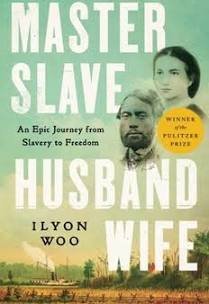Master Slave Husband Wife
by Lyon Woo
On first read, Master Slave Husband Wife is a story of the daring and ingenious escape from enslavement of a young couple, William and Ellen Craft, in mid-18th century Georgia. It is a true story and, even knowing the outcome, it will keep you on the edge of your seat. The author, Ilyon Woo, who recently won the Pulitzer Prize for this work, has used the story of the Crafts’ escape, originally detailed in a short book written by William Craft, Running 1000 Miles for Freedom, as the starting point for her work of history. If you only read Woo’s book for their story, it will be enough. Their ingenuity, heroism, and determination are inspirational.
But Woo uses William and Ellen’s story to bring alive the history of the period just before the Civil War. It is a time of daring escapes by enslaved people, of southerners for whom recapturing “their” escaped “property” becomes a matter of principle, of organized abolitionists who struggle with each other over whether violence should be used to fight slavery, of politicians who agonize over how much to compromise to save the Union. Woo brings us into this turbulent and complicated world through William and Ellen’s journey through it, as they navigate their own search for freedom, but also that of their families (of origin and families not yet born) and of all those enslaved.
A big part of their story occurs within eyesight of our home at the Esplanade. Boston, and in particular Beacon Hill, was a major center of abolitionist activity. The Crafts arrived here just before passage of the Fugitive Slave Act, a northern compromise with the Southern states permitting Southern slave-owners to capture and reclaim those enslaved people who had escaped to the North. The Crafts’ story in Boston is also a page-turner. I recommend supplementing it with a walk on the Black Heritage Trail through Beacon Hill, the site of many of the book’s events.
The focus of the book did raise some questions in our book group. Did it provide a clear enough picture of the horrors of slavery? Did Ellen truly feel discounted and diminished as a woman among the abolitionists, as the author seems to conclude? And for those of us who also read William Craft’s original work (available on Kindle for $3.99!), did the author do full justice to his courageous, principled, and, at times, dryly humorous voice?
But those are minor points. The book is a fascinating and informative history of two heroic figures and of a complicated and turbulent time.
Barbara Ogur

